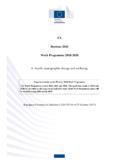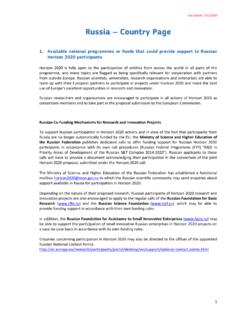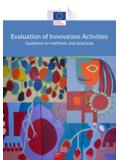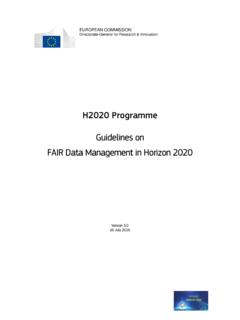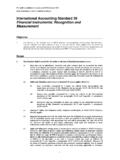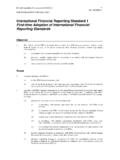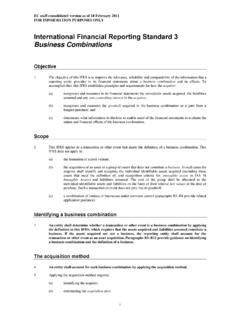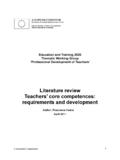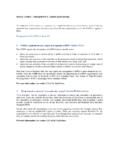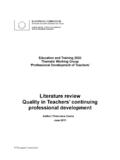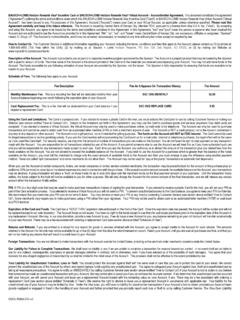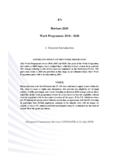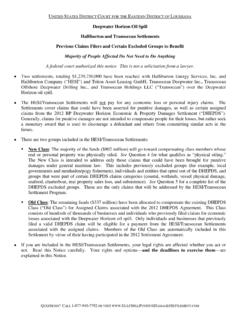Transcription of HORIZON 2020 - European Commission
1 HORIZON 2020. PROPOSAL EVALUATION. Standard briefing Version 29 November 2017. HISTORY OF CHANGES. Version Publication date Changes Slide 10 Bullet point on what experts should do in cases of applicant misconduct Slide 3 New slide on the outcome of the UK referendum and HORIZON 2020. Slide 4 New slide on countries eligible for funding in HORIZON 2020. Slide 15 Reference to CoI posed by experts involved in mock evaluations Slide 3 insertion of link to FAQ on UK referendum Slide 43- delete reference to scoring Slide 15 and 16 clarify bullet points on what constitutes a CoI. Slide 4 Further clarification on countries eligible for funding in HORIZON 2020.
2 Slide 31-35 clarification of excellence and implementation criteria as per General Annex H. Slides on Focus Areas included (in annexes). Slide 21 note added about expected impact Slide describing ethics review removed Slide 42 New slide on gender biases Slides on SME instrument removed (now part of EIC pilot). Other small changes ( ) to align with latest WP General Annexes More info: Outcome of the UK referendum and HORIZON 2020: State of Play Until the UK leaves the EU, EU law continues to apply to and within the UK, both when it comes to rights and obligations. This includes the eligibility of UK legal entities to participate and receive funding in HORIZON 2020 actions.
3 Experts should not evaluate proposals with UK participants any differently than before. HORIZON 2020. 3. Countries whose entities are eligible for funding Member States of the European Union, including their overseas departments and outermost regions. Associated Countries Iceland, Norway, Albania, Bosnia and Herzegovina, FYRM, Montenegro, Serbia, Turkey, Israel, Moldova, Switzerland, Faroe Islands, Ukraine, Tunisia, Georgia, Armenia Third Countries eligible for funding see the 'Annex A - List of countries, and applicable rules for funding'. Exceptionally, other countries if: Bilateral agreement EU-US/NIH arrangement Identified in the Work Programme Deemed essential for carrying out the action.
4 The participation has clear benefits for the consortium, such as: outstanding competence/expertise access to research infrastructure access to particular geographical environments access to data. HORIZON 2020. 4. Content Instructions for moderators/project officers using slides: Please select and use only the slides which are relevant to your call/topic. HORIZON 2020: an EU R&I programme More emphasis on challenge based calls with impact Implementing Focus Areas or 'virtual calls'. Cross-cutting issues Role of independent experts Confidentiality Conflicts of interest The evaluation procedure in practice Individual evaluation, including evaluation criteria and proposal scoring Consensus Panel review and ranking, including proposals with identical total scores HORIZON 2020.
5 5. HORIZON 2020. PROPOSAL EVALUATION. Calls and proposals Calls are challenge-based, and give flexibility and space to proposers Calls are less prescriptive - do not outline the expected solutions to the problem, nor the approach to be taken to solve it Calls/topics descriptions allow plenty of scope for applicants to propose novel solutions of their own choice Greater emphasis on impact, through 'Expected impact statements'. Applicants are asked to explain how work will bring about described impacts During the evaluation, you are asked to assess this potential contribution HORIZON 2020. 7. Implementing Focus Areas through 'virtual calls' in WP 2018-20.
6 There are 4 focus areas which are aligned with major political or policy drivers & expected to generate exceptional impact. Focus areas are 'virtually linked calls', which constitute the linking of calls/topics from respective parts of HORIZON 2020. The rational and objectives of the four focus areas are described in the General Introduction, which needs to be taken into account in the evaluation where relevant. Contributing calls and topics are clearly marked (common call identifier). HORIZON 2020. 8. Common 'virtual' call title and call identifier Building a low-carbon, climate resilient future: H2020-LC-2018-2020.
7 Digitising and transforming European industry and services: H2020-DT-2018-2020. Connecting economic and environmental gains the Circular Economy: H2020-CE-2018-2020. Boosting the effectiveness of the Security Union: H2020-SU-2018-2020. HORIZON 2020. 9. Cross-cutting issues Cross-cutting issues integrated in the work programme (WP). Social Sciences and Humanities (SSH) integrated across all HORIZON 2020 activities Gender dimension in the content of R&I - question on the relevance of sex/gender analysis is included in proposal templates The strategic approach to international cooperation consists of a general opening of the WP and targeted activities across all relevant HORIZON 2020 parts Information on 'automatic funding' to third country participants is restricted see list of countries Other cross-cutting issues may also be included in the WP.
8 Responsible Research and Innovation (RRI), ethics ; open access to scientific publications; climate change and sustainable development; standardisation . HORIZON 2020. 10. HORIZON 2020. PROPOSAL EVALUATION. ROLE OF INDEPENDENT. EXPERTS. Role of independent experts As an independent expert, you evaluate proposals submitted in response to a given call You are responsible for carrying out the evaluation of the proposals yourself You are not allowed to delegate the work to another person! You must close reports in the electronic system within a given deadline This is part of your contractual obligations! The allowance/expenses you claim may be reduced or rejected otherwise Significant funding decisions will be made on the basis of your assessment If you suspect any form of misconduct ( plagiarism, double funding), please report this to EC/Agency staff You need not comment on ethics, as proposals that are successful in this scientific evaluation will undergo an ethics review HORIZON 2020.
9 12. Guiding principles Independence You are evaluating in a personal capacity You represent neither your employer, nor your country! Impartiality You must treat all proposals equally and evaluate them impartially on their merits, irrespective of their origin or the identity of the applicants Objectivity You evaluate each proposal as submitted; meaning on its own merit, not its potential if certain changes were to be made Accuracy You make your judgment against the official evaluation criteria and the call or topic the proposal addresses, and nothing else Consistency You apply the same standard of judgment to all proposals HORIZON 2020.
10 13. Confidentiality You must: Not discuss evaluation matters, such as the content of proposals, evaluation results or opinions of fellow experts, with anyone, including: Other experts or Commission /Agencies staff or any other person ( colleagues, students ) not directly involved in the evaluation of the proposal The sole exception: your fellow experts who are evaluating the same proposal in a consensus group or Panel review Not contact partners in the consortium, sub-contractors or any third parties Not disclose names of your fellow experts The Commission publishes the names of the experts annually - as a group, no link can be made between an expert and a proposal Maintain confidentiality of documents, paper or electronic, at all times and wherever you do your evaluation work (on-site or remotely).
